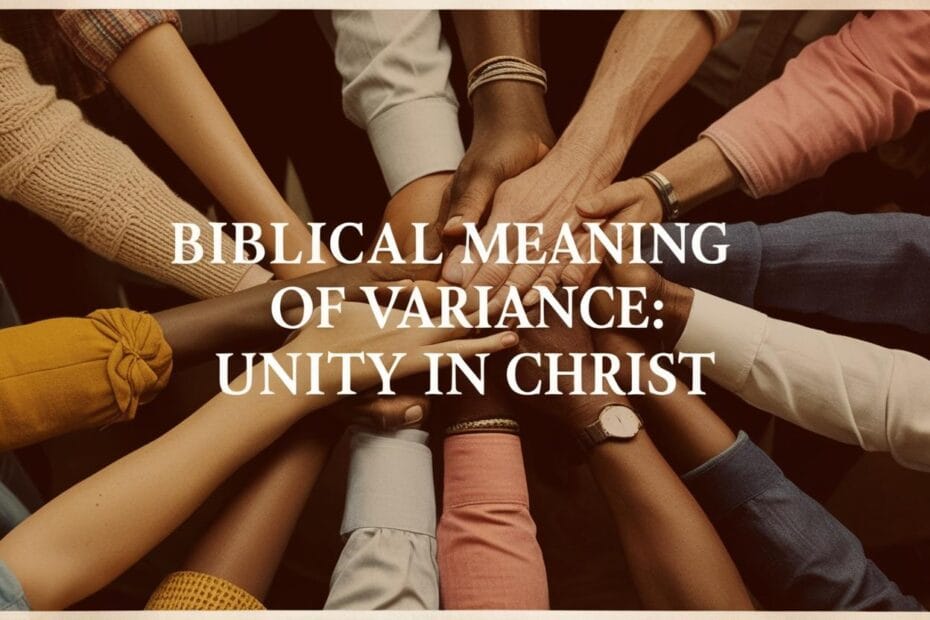The concept of variance in the Bible often points to differences, disagreements, or divisions among people, but it carries a deeper spiritual meaning tied to unity, truth, and God’s desire for harmony in His church. This article offers a Bible-based interpretation of variance, using simple language to help Christians understand its significance and apply it to their lives. By examining Scriptures, scholarly insights, and practical steps, we aim to provide clarity and encouragement for believers seeking to live in peace and obedience to God.
Biblical Meaning of Variance
Variance, in the Bible, refers to discord or division among people, often stemming from sin, pride, or a lack of alignment with God’s truth.
This meaning is rooted in passages like Galatians 5:20, where variance is listed among the “works of the flesh” that oppose the Spirit. The Greek word used here, eris, suggests strife or contention, highlighting how variance disrupts the unity God desires. Understanding this helps believers recognize the spiritual battle behind disagreements and seek God’s guidance to restore peace.
Why Variance Appears in Scripture
The Bible addresses variance because it reflects a human tendency to stray from God’s plan for unity. In Galatians 5:19-21, Paul warns that variance, along with other sins, separates people from God’s kingdom. Similarly, 1 Corinthians 1:10 urges believers to avoid divisions and be “perfectly joined together” in Christ. These verses show that variance often arises when personal desires or pride take precedence over God’s truth.
Scholars like Matthew Henry note that variance is a fruit of the flesh, born from selfish ambition or envy. John MacArthur emphasizes that such discord grieves the Holy Spirit, as it contradicts the unity Jesus prayed for in John 17:21. By addressing variance, Scripture calls believers to pursue humility and reconciliation.
The Spiritual Roots of Variance
Variance often begins in the heart, fueled by emotions like anger, jealousy, or unforgiveness. James 4:1 asks, “What causes fights and quarrels among you? Don’t they come from your desires that battle within you?” This verse reveals that internal struggles can manifest as external conflicts, creating division in families, churches, or communities.
- Pride: Elevating self above others leads to arguments and strife.
- Envy: Desiring what others have can spark resentment and discord.
- Unforgiveness: Holding grudges prevents reconciliation and fosters division.
To overcome these roots, believers must seek God’s grace and practice humility. Prayer and repentance are key to aligning the heart with God’s desire for peace.
How Variance Affects the Church
Variance can weaken the church by breaking the unity that Jesus prayed for. When believers argue over doctrines, preferences, or leadership, the church’s witness to the world suffers. John 17:21 records Jesus’ prayer that His followers be one, “so that the world may believe” in Him. Division, therefore, not only harms relationships but also hinders the spread of the Gospel.
Practical steps to address variance in the church include:
- Prayer: Ask God for wisdom and humility to resolve conflicts (James 1:5).
- Dialogue: Speak truthfully but lovingly, as Ephesians 4:15 encourages.
- Forgiveness: Release offenses, following Jesus’ teaching in Matthew 18:21-22.
By prioritizing unity, the church can reflect Christ’s love and fulfill its mission.
Overcoming Variance Through God’s Word
God’s Word provides clear guidance for overcoming variance. Philippians 2:3-4 instructs believers to “do nothing out of selfish ambition or vain conceit” but to value others above themselves. This mindset counters the pride that fuels discord. Additionally, Colossians 3:13 calls Christians to “bear with each other and forgive one another,” mirroring God’s forgiveness toward us.
Believers can apply these truths by:
- Studying Scripture: Let God’s Word shape thoughts and actions.
- Seeking the Spirit: Rely on the Holy Spirit to produce peace and patience (Galatians 5:22-23).
- Serving Others: Focus on others’ needs to build unity and love.
These steps help Christians replace variance with the fruit of the Spirit, fostering harmony in relationships.
Practical Applications for Daily Life
Living free from variance requires intentional choices rooted in faith. Here are practical ways to apply biblical principles:
- Pray Daily: Ask God to reveal and heal any roots of discord in your heart.
- Practice Humility: Apologize when wrong and seek reconciliation quickly.
- Listen Actively: Understand others’ perspectives before responding.
- Forgive Promptly: Release grudges, trusting God to bring justice.
- Encourage Unity: Build bridges in your family, church, or workplace.
By taking these steps, believers can honor God and create environments of peace. Regular prayer and obedience to Scripture empower Christians to overcome variance and walk in love.
“Let us pursue what makes for peace and for mutual upbuilding” (Romans 14:19).
Summary of Variance’s Biblical Meanings
| Aspect | Biblical Meaning | Key Scripture |
|---|---|---|
| Definition | Discord or division due to sin or pride | Galatians 5:20 |
| Spiritual Root | Pride, envy, or unforgiveness | James 4:1 |
| Impact on Church | Weakens unity and Gospel witness | John 17:21 |
| Solution | Humility, forgiveness, and reliance on God | Philippians 2:3-4 |
FAQ: Common Questions About Variance in the Bible
What does variance mean in Galatians 5:20?
Variance in Galatians 5:20 refers to strife or contention that divides people, listed as a work of the flesh. It stems from sinful desires like pride or envy. Christians are called to replace variance with the Spirit’s fruit, such as peace and patience.
How can I avoid variance in my relationships?
To avoid variance, practice humility, forgive quickly, and seek God’s guidance through prayer (Philippians 2:3-4). Listen to others with love and prioritize unity. Trusting God’s Word helps you respond with grace, even in conflict.
Is variance the same as disagreement?
Variance goes beyond mere disagreement, as it involves sinful attitudes like pride or bitterness that cause division (James 4:1). Healthy disagreement can be resolved through love and truth. Variance, however, requires repentance and spiritual growth.
Why does God care about variance?
God cares about variance because it disrupts the unity He desires for His people (John 17:21). Division weakens the church’s witness and grieves the Holy Spirit. God calls believers to live in peace to reflect His love.
How can prayer help with variance?
Prayer invites God’s wisdom and peace into conflicts, softening hearts and guiding solutions (James 1:5). It helps believers forgive and seek unity. Praying for others fosters love, reducing the roots of variance.
Addressing Google’s “People Also Asked” Questions
What Is the Biblical Opposite of Variance?
The biblical opposite of variance is unity or peace, as seen in Ephesians 4:3, where Paul urges believers to “keep the unity of the Spirit through the bond of peace.” Unity reflects God’s heart for His people to love and support one another. Christians can cultivate this by practicing forgiveness, humility, and prayer.
How Does Variance Relate to Other Works of the Flesh?
Variance is one of several works of the flesh listed in Galatians 5:19-21, alongside sins like hatred, jealousy, and selfish ambition. These sins share a common root: a heart turned away from God’s Spirit. Overcoming variance requires the same repentance and reliance on the Holy Spirit needed to address other fleshly behaviors.
Can Variance Be a Sign of Spiritual Attack?
Yes, variance can be influenced by spiritual attacks, as Satan seeks to divide God’s people (Ephesians 6:12). Discord often amplifies when believers neglect prayer or Scripture. Putting on the “armor of God” through faith and truth helps resist these attacks and restore peace.
How Did Jesus Address Variance?
Jesus addressed variance by teaching love, forgiveness, and unity. In Matthew 5:23-24, He instructs believers to reconcile before offering gifts at the altar. His prayer in John 17:21 for believers’ unity shows His heart for harmony, urging Christians to follow His example.
What Role Does Forgiveness Play in Overcoming Variance?
Forgiveness is central to overcoming variance, as it releases bitterness and restores relationships (Colossians 3:13). Jesus emphasized forgiving others repeatedly (Matthew 18:21-22). By forgiving, believers reflect God’s grace and break the cycle of discord.
A Prayer to Overcome Variance
Heavenly Father, we come before You seeking Your peace and unity. Forgive us for any pride, envy, or unforgiveness that causes division. Fill us with Your Spirit, guiding us to love, forgive, and honor one another, as You have loved us. In Jesus’ name, Amen.
References
- Henry, Matthew. Matthew Henry’s Commentary on the Whole Bible. Hendrickson Publishers, 1991.
- MacArthur, John. The MacArthur Bible Commentary. Thomas Nelson, 2005.
- Wiersbe, Warren W. The Bible Exposition Commentary. David C. Cook, 2004.
- The Holy Bible, New International Version. Zondervan, 2011.

